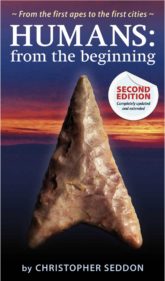
In just a few years, our understanding of the human past has changed beyond recognition as new discoveries and advances in genetic techniques overturn long-held beliefs and make international news.
Drawing upon expert literature and the latest research, HUMANS: FROM THE BEGINNING is a rigorous but accessible guide to the human story, presenting an even-handed account of events from the first apes to the rise of the first cities and civilisations. Along the way, we learn about the emergence of modern human behaviour, prehistoric art, early modern human migrations from Africa, the peopling of the world, and how farming and agriculture replaced hunter-gathering.
Following its successful launch in 2014, HUMANS: FROM THE BEGINNING has now been released in a second edition, which has been substantially rewritten and brought fully up to date with the latest developments.
New finds include evidence that apelike hominids made stone tools; that small-brained Homo naledi lived alongside Homo sapiens in Africa; and that Neanderthals, Denisovans, and Homo sapiens all repeatedly interbred. There is also expanded coverage of ancient Mesopotamia and Egypt, with new chapters on the Mesolithic and later prehistory of Europe, the Minoans and Mycenaeans, and the Late Bronze Age collapse of Eastern Mediterranean civilisation. Other topics such as Neanderthal symbolic behaviour and the origin of the Indo-European languages are re-examined in the light of the latest evidence.
Humans: from the beginning is written for the non-specialist, but it is sufficiently comprehensive and well-referenced to serve as an ideal ‘one-stop’ text not only for undergraduate students, but also for postgraduates, researchers, and other academics seeking to broaden their knowledge.

